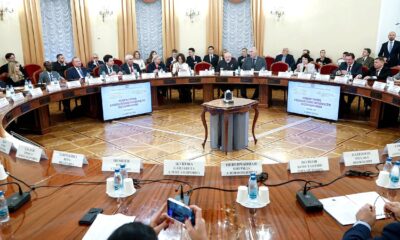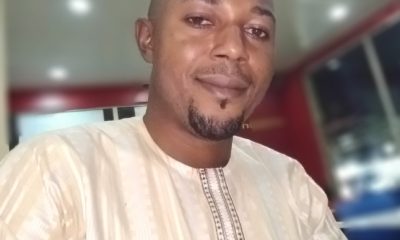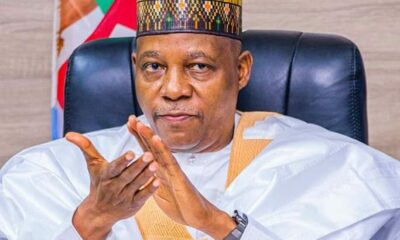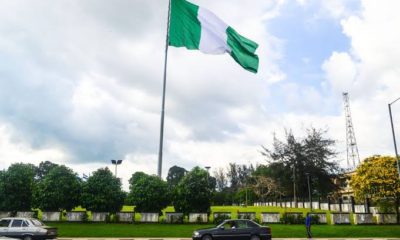National Issues
The Real Quarrel with the OAU Vice-Chancellor Designate -By Jedun Opaloka


The appointment of Professor Ayobami Salami as the new Vice-Chancellor of the Obafemi Awolowo University, Ile-Ife has now brought to an end the earlier suspended selection of a new Vice-Chancellor for a five-year term for the University. The suspension of the selection process was occasioned by the violent protests from two non-teaching staff Unions, NASU and SSANU, condemning the selection process because it was considered as a violation of University statutory provisions governing the selection of a new Vice-Chancellor. Their claim was that the Governing Council usurped the statutory duty of the Joint Council and Senate Selection Board by shortlisting candidates before the Joint Council/Senate Selection Board was even put in place in the first instance.
I have followed the various events and the politics around the selection process from the view points of both the aspirants and the condemning unions through their released statements, protests, ASUU interactive forum, and also through comments from senior academic staff members and of course from the grapevine as well. From all these, it was evident that the protests arose from a lack of awareness and understanding of the current provisions that have made the Governing Council self-regulating with respect to the selection of a Vice-Chancellor. This ignorance then became a veil for aggregating and venting bottled displeasure with the out-going Vice-Chancellor which was then couched as a manipulation of the selection process to favour that the candidature of Prof Ayobami Salami. The ignorance of the selection procedure also affected some of the candidates that applied, a situation that caught some of them unaware with respect to networking and establishing rapport with the ‘kingmakers’, that is, the Governing Council members. They had thought the change of government would affect the composition of the Council whose membership were composed under the PDP-led government. This informed the persistent call for the dissolution of the current Council and the blackmailing of its members as having being compromised.
Rather than own up to the fact of their ill-preparedness, some of the internal candidates picked up grouse with Professor Salami. Their grouse with him lied in the choice of method he used to campaign for support as against that of the rest of the aspirants to the office of Vice-Chancellor. And I would like to liken the situation to our days of Nelkon and Parker (Physics) or Stone and Cozen (Biology) in the Secondary School WAEC/GCE syllabus. In those days, we always charged students of doing one of three different things in relation to the syllabus scope. Those that passed well as are usually described, as having read within the syllabus while those who did not do so well enough or those who failed as having done oversyllabus, belowsyllabus or undersyllabus. For short, they had read outside the scope of the syllabus.
So far, there have been two syllabuses for those vying for the office of Vice-Chancellor in Nigerian Universities. There was the Old Syllabus which required that names of only three successful candidates to be sent to the Visitor who was then vested with the power to pick and announce anyone out of the ranked three. In the New Syllabus underpinned by the autonomy granted to Universities courtesy of the 2009 ASUU-FG Agreement, Governing Councils of universities have been vested with the responsibility to select and appoint Vice-Chancellors with a proviso to only notify the Visitor as a matter of courtesy. In view of the foregoing therefore, Professor Salami could be viewed as having read within the New Syllabus while some of his co-contestants hinged their preparations on the Old Syllabus and therefore fell into the undesirable category of undesyllabus.
And what enabled Professor Salami to have read within the New Syllabus? The wisdom to do so must have derived from his unassailable, diverse and rich administrative experiences covering more than two decades in the University. Professor Salami was elected to the University Senate from the Congregation in a non-professorial capacity for two terms from 1996 to 2000. For those who usually nurse the ambition of being elected one day to sit at the helms of affairs in a University, the Senate is one of the most crucial training grounds in which members are exposed to the nitty-gritty of decision making and the political maneuverings required in serving the interest of the University community. From the Congregation at first in 2003, he was also elected to the Governing Council of the University for the maximum two terms which ended in 2007. As the highest ruling organ of the University that always oversees the policy direction of the University and the selection of new Vice-Chancellors, the intricacies and subtleties guiding University administration must have further boosted his interest for higher leadership roles in the University. While he was in Senate in 1996, Professor Wale Omole was the Vice-Chancellor. Prof Salami has been part of the transitions from Professor Wale Omole to Professor Roger Makanjuola and then to Prof Mike Faborode. All these selections, were done under the Old Syllabus. As a member of the Council then, he participated very actively in the ushering in of the new Vice-Chancellor, Professor Michael Faborode. From 2006, he was appointed Director of the Institute of Ecology and Environmental Studies up till 2010 when he again became a Member of the Governing Council of Rufus Giwa Polytechnic, Owo in Ondo Stae from 2010 to 2014. As an insider and a member of the team that supported Professor Tale Omole as Vice-Chancellor in 2011, Professor Salami was elected to become the Deputy Vice-Chancellor of the University, a post he has held till date. Professor Tale Omole became the first OAU New Syllabus Vice-Chancellor.
Professor Salami has traversed all these transitions from different University administrations at Obafemi Awolowo University as a key player in the highest decision making organs of the University and thereby was in good knowledge of when both the Old Syllabus and the New Syllabus came into force and when the Old ceased to be in force. Armed with this knowledge, he had known which direction his campaign strategy would move. So while most of the aspirants started functioning within the Old Syllabus and doing undersyllabus with the New, by focusing more on outside influences such as running after governors, prostrating in royal palaces across Yoruba land, and courting influential Pentecostal men of God all over Nigeria, Professor Salami simply chose to be guided by his administrative experience in the recent past. He perhaps simply thought that if I could talk to Professor Lagbaja and Dr. Lakasegbe who are the newly empowered agents of selection in the New Syllabus, the outside influence might be for a later date if need be in the end.
Contrary to the issue of imposition touted against the outgoing Vice-Chancellor, Professor Tale Omole, by NASU and SSANU in their releases and declarations in their protests and advertisement in the national dailies, Professor Salami was and is still a grass root person. Leaning on his enviable administrative experience – as the Director of the Institute of Ecology and Environmental Studies; former Secretary of Academic Staff Union of Universities (ASUU) OAU Branch; Member of the Governing Board of a number of agencies and centres on campus; Head of several statutory committees in the University; two-term Membership of the University Senate as Congregation Representative; his two-term Membership of the University Governing Council; and the Deputy Vice-Chancellor of the University (in addition to being former Student Union leader), Prof Salami has touched on many aspects of the University positively. With all other credentials put together, Professor Salami channeled his campaign to Senate and Council members as a way of boosting his chances of emerging as the 11th Vice-Chancellor of the University. One of the professors that I work with told me on several occasions that Salami has reached all the nooks and crannies of this University trying to convince people including those not in Senate and Council. And he seems to be succeeding with very many professors as I have noticed.
The impression of many members of the University community is that a number of the aspirants to the office of the Vice-Chancellor did not even campaign to any of the Internal Members of the Governing Council who they knew so well while Salami was running up and down, his impressive and compelling credentials notwithstanding. Another factor that spoke more eloquently of Professor Salami’s chances above all other candidates was an intimidating list of several grants he has brought into the University since 2004 as a world-renown researcher. He is ranked as one the best two researchers in terms of research funds attracted to Obafemi Awolowo University. As a Research Assistant to a Professor in the University myself, grants to the University is cardinal for research to run and for students to be abreast of standard practices in research and knowledge dissemination.
In terms of preparation for the race, few of the aspirants seemed to have started early enough. Quite a number of them just woke up with the call for applications for the vacant job in December 2015. Unlike others, Professor had been preparing for becoming Vice-Chancellor a long while ago given his administrative experience over time which towered over that of all others. His strategy was to build his intimidating CV rather than depend on the goodwill of godfathers.
The Governing Council did their shortlisting and the result was a shock to the University and particularly those who had expected their candidates to make the shortlist. The result should be a big shame to the University! Out of eleven aspirants who applied, only six were shortlisted with five of Obafemi Awolowo University professors knocked out of the list while two contestants from FUTA made the list. The five professors were knocked out for not being productive in scientific publications for the past five years or since the announcement of their professorship, lack of international exposure and lack of grants attracted to the University. Instead of staff unions protesting against the shortlisting, they should be ashamed because this was a big statement on the state of research in the University. How can such professors sustain themselves on their jobs in foreign universities where you have to justify the reasons the University must keep you for the next minute? How would the University now account for the research grants in tertiary institutions such as ETF and TETFUND to the Federal Government? The University administration must find a way of shaking up this lethargy among academics, especially professors, who traditionally are supposed to be the drivers of research innovations.
Coming to the University statutes, the Governing Council is empowered to shortlist and this was aptly stated in the advertisement that the candidates responded to. It is this list that the Joint Council and Senate Selection Board would consider for the final selection of the new Vice-Chancellor. Contrary to NASU and SSANU position that the Governing Council ranked shortlisted candidates, the Council did not rank but drew up a fair and transparent guidelines from the advertised eligibility criteria in order to come up with a shortlist. The two unions based their understanding of shortlisting on the exercise of the last Governing Council that produced Professor Tale Omole during which all the candidates proceeded to the interview level with the Joint Council and Senate Selection Board.
The results of the shortlist attracted some reactions on campus. The first was mass protests by NASU and SSANU who believed the selection process was skewed in favour of Prof. Salami. The second was from the grapevine and it had it that an aspirant protested in writing to Abuja. The third was a formation of allied forces which included the contestants who did not make the shortlist, the NASU/SSANU and the OAU contestants who made the list. The two contestants from FUTA did not join them. The OAU contestants were at first happy with their inclusion in the shortlist but were later made, by those not shortlisted, to suddenly buy into the idea that the Governing Council was already under Salami’s occupation given their earlier strict compliance with the Old Syllabus. But, let us look at the Senate election critically against the claim of imposition by the allied forces. The election was conducted with over 300 professors voting, beside non-professorial representatives of Congregations, Departments and other units. Was it the Vice-Chancellor of the University who spoke to them all including those in the opposition? I do not think it would be proper for any contestant who participated actively in this election to now begin to speak ill of it outside.
The allied forces lost faith in the Governing Council as an impartial umpire to carry out a transparent and fair selection of a new Vice-Chancellor and in ASUU because it did not condemn the selection process which they, the allied forces, considered to be a violation of the University provisions guiding the selection of a new Vice-Chancellor. However, a number of ASUU members claimed that they were shocked by the results of the shortlist of the Council but that their fear was allayed after elected Congregation representatives in the Governing Council reported the selection process in Congress, laying bare the Council criteria and the corresponding weights attached to them. ASUU also organized an interactive forum as a platform for exchange between the contestants and ASUU members. Only three contestants honoured the invitation – Professor Salami and the two contestants from FUTA. The OAU three must have probably adhered to the advice of the allied forces. They turned down the invitation based on different personal reasons communicated in writing to the committee that organized the interaction. It was therefore not a surprise that the same candidates did not show up when the Governing Council called for the continuation and completion of the earlier suspended selection process, a process that eventually saw Professor Salami emerging as the 11th Vice Chancellor for a 5-year term commencing on 24th June, 2016.
ASUU also need to help their half brothers and sisters in unionism, that is NASU and SSANU to be more ethical in union activism and popular struggle each time there is a cause for such in the University. Right from my under- and postgraduate days and up till my temporary engagement as a Research Assistant in the Sciences, I have observed the undeserving tendencies of university staff about them. They bring egungun masquerades from town to protest, they would turn their clothes inside out and begin to rain curses on the Vice-Chancellor using amulets and charms. Same happened during Professor Michael Faborode’s tenure. Professor Faborode enjoyed three years of peace, while the remaining two were filled with acrimony over what they described as double deduction in their salaries. In spite of all these, Vice-Chancellor after Vice-Chancellor have successfully completed their term and moved on to greater and better engagement Unfortunately, ASUU too joined in this fray without appropriate investigation. Some members of ASUU stood against what they considered to be a baseless war with the administration. The internal wrangling that followed this crisis within ASUU OAU branch is yet to be fully settled till now. All unions have the right of protest but the processes of gathering pieces of information for the protest must be guided by truth and objectivity. Knowledge, which is ASUU’s stock-in-trade, generated through investigation of data is all about the communication of truth and power. Therefore, I think ASUU should provide the required leadership in this direction for their union half brothers and sisters – the sanctity of data and information must be protected for the communication of truth. The Ivory Tower shouldn’t be a home of violence but a haven where problems are solved for the society.
Once again, I like to restate that when the Old Syllabus had long ceased to be in force, it was still brimming in the psyche of some office seekers. And by the time they came close to the reality of the whole show, it was almost too late for redemption. So the real cause of the crisis in the University was not the manipulation of the selection process in favour of Prof. Salami but the ignorance of critical stakeholders about the selection process.
Jedun Opaloka is a Research Assistant resident at Obafemi Awolowo University Community, Ile-Ife.










